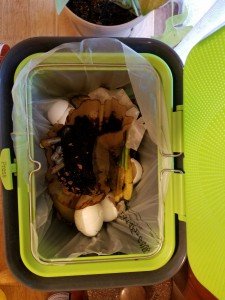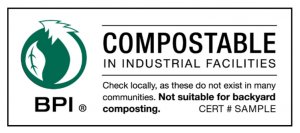By TRUDY DUNHAM
Corn on the cob. Watermelon. Zucchini. Eggplant. Summer’s bounty makes for great eating.
But what do you do with the remains? The corn cobs and husks, melon rinds and seeds, all the stems, leaves and peels from your veggies? Compost! That should be your go-to strategy. Tossing them into the trash is your last resort. And composting is easier than ever.
But does it really matter? Yes! It is all about greenhouse gas emissions, and keeping them as low as possible.
Plants are full of carbon. Photosynthesis allows plants to convert carbon dioxide in the atmosphere into food and sequester that carbon. When we harvest our fruits and vegetables, we remove carbon that otherwise would go back into the soil when the plant dies and decomposes.
In composting, the plant and food scraps decompose somewhat naturally. (The composting process mixes food scraps with leaves or straw, shredded newspaper, soil and water, and one must periodically turn the pile, so it isn’t completely natural.) While small amounts of gasses may be given off in the composting process, these gasses are natural and don’t add to greenhouse gas emissions.
When ready, the compost is spread on or mixed into the soil. It returns organic matter to the soil. The nitrogen in compost naturally increases soil productivity, reducing the need to add fertilizers. The compost makes the soil more stable, better able to hold water and inhibit erosion. The composting process sequesters the carbon, keeping it in the soil for long periods of time until it is again taken up by plants as food in the carbon cycle. All positive benefits for our climate and your garden and lawn!
 Alternatively, if we throw our food waste into the trash, it adds to greenhouse gas emissions. Trash either undergoes a waste to energy process, or it is landfilled. Your trash hauler is required to tell you what they do with your trash. Most Ramsey County trash goes to the Ramsey/Washington Recycling and Energy Board1ashington Recycling and Energy Board in Newport where it goes through a waste to energy process, but some trash is taken to a landfill.
Alternatively, if we throw our food waste into the trash, it adds to greenhouse gas emissions. Trash either undergoes a waste to energy process, or it is landfilled. Your trash hauler is required to tell you what they do with your trash. Most Ramsey County trash goes to the Ramsey/Washington Recycling and Energy Board1ashington Recycling and Energy Board in Newport where it goes through a waste to energy process, but some trash is taken to a landfill.
Waste to energy processing is a good option for trash that cannot be composted or recycled, but the end product of the incineration or gasification process is still gas, which creates greenhouse gas emissions. There is no good reason to add to our emission levels when composting is so easy.
Burying trash in a landfill should be avoided whenever possible. Food scraps rotting in a landfill emit methane and nitrous oxide, greenhouse gasses which are even more damaging than carbon dioxide.
So how can you compost your food scraps? As you clean up after eating, just put the fruit and veggie scraps in a lidded container. When it gets full or before it begins to smell, empty it in your backyard compost bin or at a Ramsey County organics drop. Line your container with a compostable bag if you are using the county Organics drop.
The Midway Recycling Center, 1943 W. Pierce Butler, is an organics drop site. Ramsey County provides a free starter kit (3-gallon lockable bin, bags, and instructions) that makes hauling mess-free. For complete information, see their website: www.ramseycounty.us/residents/recycling-waste/organic-waste.
Or, you can set up a home compost site. The University of Minnesota Extension Master Gardeners provide instructions to help you establish and manage your compost site: www.extension.umn.edu/garden/yard-garden/soils/backyard-composting-guide.
In addition to fruits and veggie food scraps, you can compost egg shells, coffee grounds and filters, and tea bags. If you are using the County organics drop, you can compost meat, bones, and dairy food scraps. Composting meat and dairy is not recommended for backyard compost sites because these foods attract rodents. The cardboard rolls from paper towels and egg cartons can also be dropped at the organics section of the Midway Recycling site. See the websites for a complete list.
 While you can pick up a free bag or two at the Midway Recycling site, you may want to purchase a supply from a store, so you have plenty on hand for events. Just be sure that the bags and any other products you want to compost have the BPI certified logo (see illustration) on them, indicating that the microbes in compost can break them down.
While you can pick up a free bag or two at the Midway Recycling site, you may want to purchase a supply from a store, so you have plenty on hand for events. Just be sure that the bags and any other products you want to compost have the BPI certified logo (see illustration) on them, indicating that the microbes in compost can break them down.
The Ramsey/Washington Recycling and Energy Board is currently engaged in planning to reduce waste, increase resource recovery and recycling, and eliminate landfill use. For more information: morevaluelesstrash.com/designation-and-master-plans.
Enjoy summer’s bounty, and compost those scraps so we limit greenhouse gas emissions and enhance the soil!
The Ready & Resilient Hamline Midway project is an initiative of the Hamline Midway Environmental Group (HMEG) to build climate change resiliency in our community.
Comments
No comments on this item Please log in to comment by clicking here